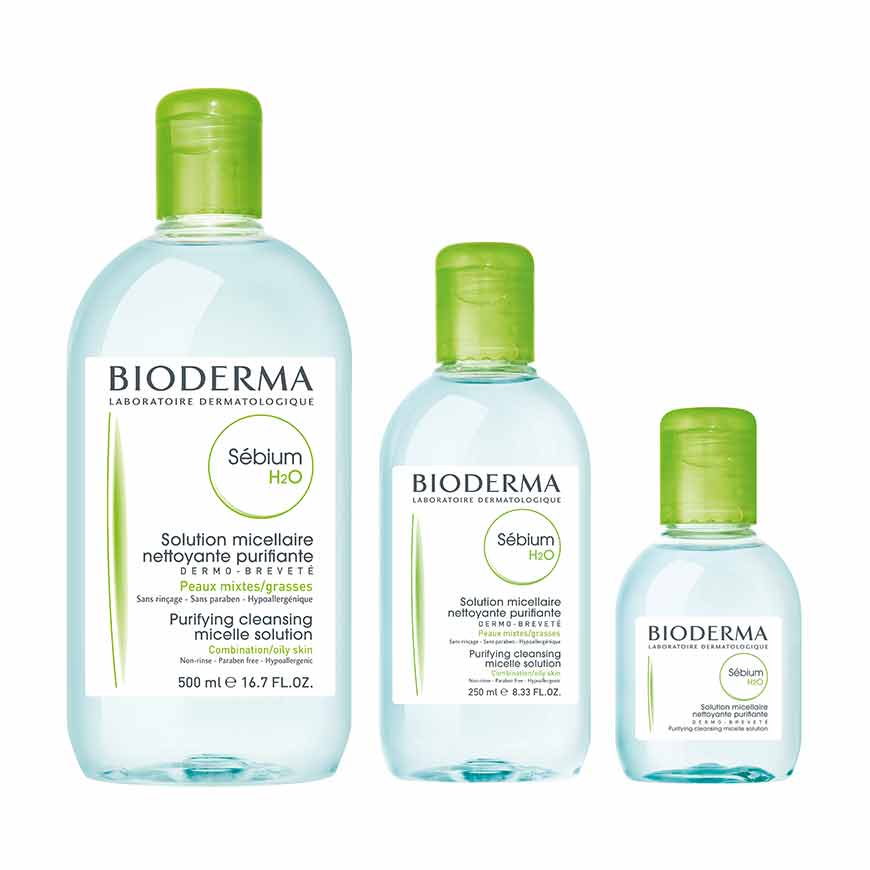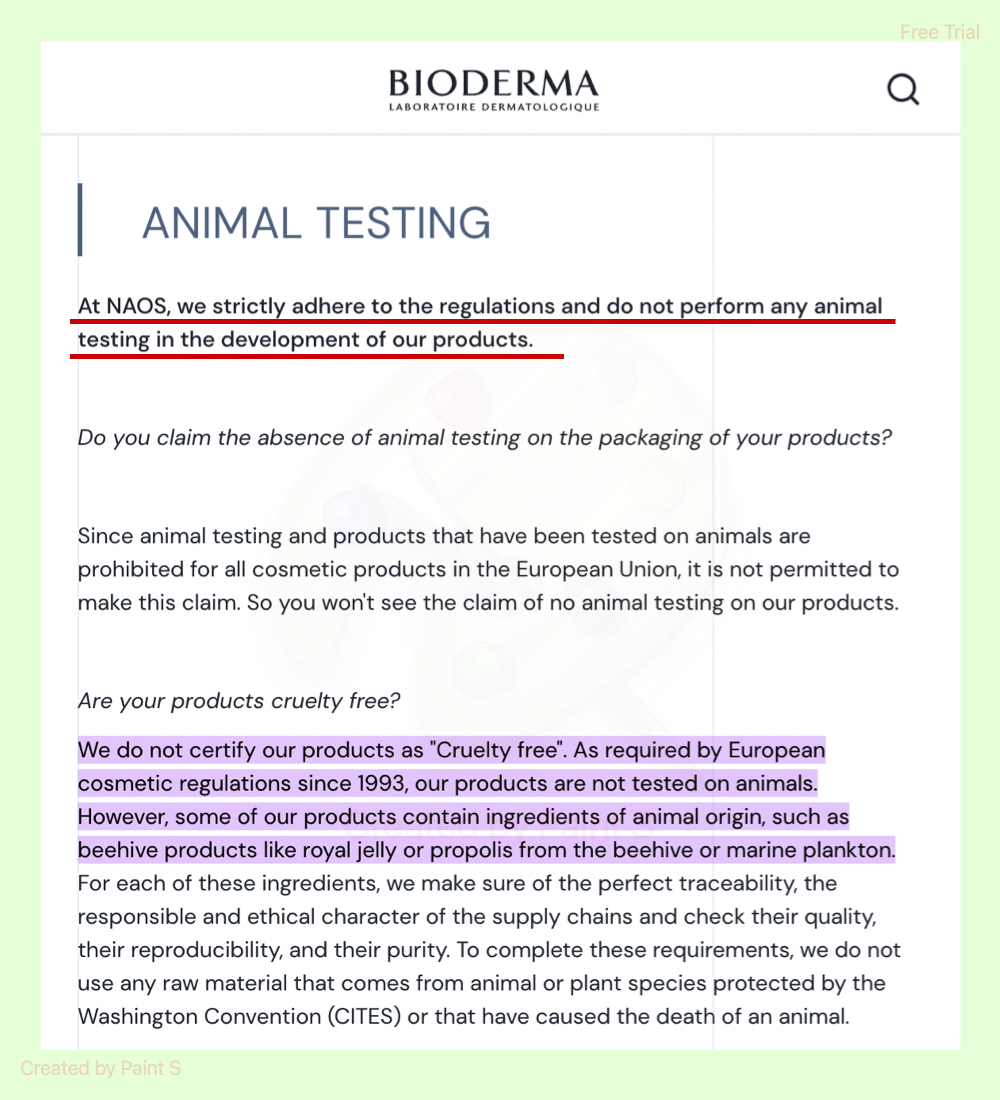Bioderma brings French dermatological expertise around the world and accessible prices. Although it doesn’t conduct animal testing, it’s still not a cruelty-free (let alone vegan) brand – here’s why.
Bioderma is not 100% cruelty-free or vegan as its products are sold where animal testing is required by law. It also cannot be considered vegan as it is not cruelty-free.
Bioderma has been around for decades and is famous for its iconic (and often replicated) micellar water.
We do like the brand’s approach – which is to train the skin to adapt to its environment and self-strengthen instead of just overloading it with active ingredients.
But before you get too excited about buying these products – you need to understand what you’re buying (and why it’s not so pretty).
Bioderma's Ethical Overview
Bioderma Is Not Cruelty-Free
Test any of its products or ingredients on animals
NO
Purchase any ingredients tested on animals within its supply chain
NO
Distribute its products to any countries that require animal testing by law.
YES
Bioderma state that they do not carry out animal testing or ask any third parties to do so on their behalf, in line with EU cosmetics regulations.
However, the brand does sell its products in stores in mainland China where animal testing is still legally required.
Bioderma’s parent company NAOS ‘is very careful to respect local regulations’ when it comes to the Chinese market.
This brings us to the next point:
Does Bioderma Test on Animals?
Bioderma has been clear that it conducts animal testing when required by law and that it does ship to countries like China. However, they still have a stance on cruelty-free cosmetics.
What Is Bioderma's Cruelty-Free Status in 2022?
Here is a screenshot of Bioderma’s official statement regarding its cruelty-free policies and vegan products, taken from its website:
Unfortunately, this doesn’t mean that the brand is 100% cruelty-free because of its distribution policy.
Bioderma Has No Cruelty-Free Certification.
Bioderma has no cruelty-free certification.
As much as it would be nice to see cruelty-free certification – it cannot happen as long as the brand continues with its current animal-testing policies.
Besides PETA, a far more reputable organization you can trust is the Leaping Bunny association, which has rigid (but excellent) standards.
Is Bioderma Sold Where Animal Testing is Required By Law?
Yes, Bioderma distributes its products in China, where animal testing on cosmetics is required as products arrive at the border.
China has a shocking track record. It is the country with the most animal testing globally, with over 20 million animals used per year.
However, if you live in China or are concerned about its cruel beauty policies, there are a couple of loopholes.
Here's how to find cruelty-free cosmetics in China: Are Cosmetics Made in China Cruelty-Free?
Bioderma is Not Vegan
Bioderma does not claim to have vegan ranges. Even if they did, it would be hard to consider any of its products that are free of animal-derived ingredients as “vegan” because it’s not 100% cruelty-free.
A few animal-derived ingredients that Bioderma still uses include royal jelly, propolis, and marine plankton.
Did you know that plankton is a crucial component of ocean ecosystems? Not just as a food source but for the oxygen and nutrients it produces.
Some types of plankton are used in skincare and cosmetics because the natural antioxidants and minerals can help against free radicals.
If you are vegan or are a strong advocate of cruelty-free cosmetics – Bioderma is not the right brand for you.
Luckily, there are many alternatives you can find that are certified cruelty-free and vegan to choose from.
Here are some dermatologist-developed skincare brands within the same price range that are 100% vegan and cruelty-free.
Vegan Alternatives to Bioderma
Brand | price range | 100% vegan | Certification |
|---|---|---|---|
$5 - $15 | Yes | PETA, Leaping Bunny | |
$20 - $50 | Yes | Leaping Bunny | |
$20 - $50 | Yes | PETA, Leaping Bunny | |
$5 - $20 | Yes | Leaping Bunny | |
$15 - $30 | Yes | Leaping Bunny |
Bioderma Isn't Considered Natural or Organic
Bioderma isn’t considered natural or organic. But it does claim to use safe, simple, and clean ingredients.
Its whole ethos is to make clean formulas and products that anyone can use.
All products use a certain amount of synthetic ingredients in their formulas. Bioderma is no exception – but it does choose to use better or clean synthetics.
If a synthetic ingredient is "clean," it means it is safe and non-toxic for us. Its purpose is to preserve the stability of a beauty formulation.
Bioderma Has an 82-100% Allergen-free Ranking
According to Skin Safe, Bioderma has an 82- 100% allergen-free ranking across 107 products.
Many of Bioderma’s products are free of allergens such as parabens, lanolin, topical antibiotics, coconut, MCI/MI, nickel, gluten, soy, propylene glycol, irritants, oils, dyes, and SLS.
The EU/UK Have Stricter Ingredient Regulations
We don’t want to scare you, but you HAVE to read up on any product’s ingredient list before you make a purchase – especially if you live within the United States. The reason why will shock you.
The FDA has only banned or restricted 11 harmful chemicals from cosmetics within the country. Europe and the UK, on the other hand, have banned 1,328!
Given Bioderma is a UK/EU-based brand with strict ingredient policies – you don't need to worry too much.
While Bioderma doesn’t brand itself as ‘clean beauty,’ they do focus on safe ingredients. So, you shouldn’t worry about any serious hidden nasties in its products.
Bioderma Has Some Sustainable & Ethical Initiatives
Bioderma likes to. Support ethical causes around child health and education.
It is also taking strong environmental accountability by:
Final Thoughts
We can’t fault Bioderma from a skincare perspective. It is a well-developed brand that does prioritize good skin health.
We also appreciate that it considers some ethical factors and is relatively transparent about its policies and eco-efforts.
However, the fact that it is not cruelty-free means it takes a step in the wrong direction. As much as Bioderma claims to be actively against animal testing, they choose to distribute to China, which is a direct conflict of interest.
For this reason, we cannot consider its products that are free of animal-derived ingredients as holistically vegan either.
We hope to see a change in this issue, but it is unlikely right now. As consumers, it is up to us to stand for what we will and won't accept from our cosmetics. This is something we cannot accept.


